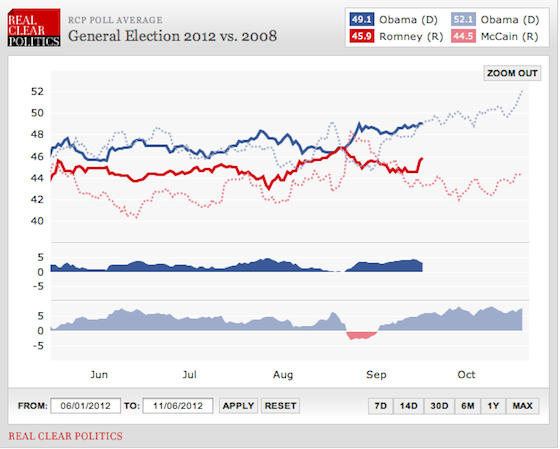I almost never watch the political ‘debates’ since their carefully choreographed format makes them more like joint press conferences, where the candidates regurgitate the closest prepared and rehearsed responses to whatever question is posed to them, than authentic debates. The ‘town hall’ format where audience members ask questions are more fun since the general public is less predictable in their questions than mainstream journalists.
I am in two minds about whether to watch Wednesday’s debate from 9:00-10:30 pm US Eastern time. If the race were close, then each candidate would play it safe, not wanting to risk making a mistake since a mistake is more likely to hurt than a piece of brilliance will help. And both candidates are by nature cautious people. Furthermore, there is considerable evidence that debates don’t matter that much in swaying people’s opinions about whom they will vote for. They seem to serve mainly as fodder for the political pundits to chew over.
So why the fascination with debates? Perhaps because at this stage of the game the candidates are in such tight cocoons, with every movement choreographed and words scripted, that any occasion that is somewhat unscripted carries with it a chance of them saying something fresh.
Since Mitt Romney is behind, there is great hope and expectation among his supporters that he will do something dramatic to change the dynamics of the race. Usually each side tries to lower expectations for their candidate and raise that of the opponent but in an unusual move, Romney’s camp has raised expectations by letting it be known that he has been preparing ‘zingers’ since August though it seems odd that they would publicly say so since that only raises the bar for him. Obama’s staff have warned people not to expect any zingers from him and so it seems that the Romney team have lost the zingers expectations game.
One thing that Romney has going for him is that the political chattering class hate it when an election is drifting along to a seemingly foregone conclusion with no change in who is leading. So they are likely to look for any signs of life from Romney or his campaign to hype, hoping to make it seem like a close race. As a result, we can expect to see the trumpeting of even the slightest uptick in the polls in his favor or them digging deep into the internals to find some small trend that is going his way.
It is like 2008 when John McCain was steadily trailing in the polls and almost any event was portrayed as good news for McCain. Speaking of 2008, here is a comparison of average polls results for the two elections, showing how remarkably similar they are. If anything, the trend this year is steadier that 2008, when McCain-Palin briefly took the lead for about a week after the Palin announcement and the Republican convention.
This is why there has been such extensive coverage of the claim that almost all the polls are skewed (either due to incompetence or deliberate fraud) in favor of Obama and the Democrats though, as Mark Blumenthal points out, they seem to be following the same methodology they always follow that have proved to be pretty accurate.
Rather than individual polls which come thick and fast and have their own house effects that can be confusing, many observers look at the analyses of people like Sam Wang of the Princeton Election Consortium (his work is explained in this article) and Nate Silver at FiveThirtyEight, who look at poll aggregates, or at stock market-like trading sites the Iowa Electronic Markets and Intrade.
All of them have been showing a steady Obama lead that has increased slightly over time, with the current odds of him winning in the 70-80% range and likely getting around 320 electoral votes. Note that these are the odds of Obama winning, not the predicted share of the vote.


I almost never watch the political ‘debates’ since their carefully choreographed format makes them more like joint press conferences, where the candidates regurgitate the closest prepared and rehearsed responses to whatever question is posed to them, than authentic debates.
They are, indeed, joint news conferences, not debates. IMHO, nobody actually wins an election due to his/her performance in one of these joint news conferences. There are examples of candidates losing because of something they said in the debate or because of their personal appearance or demeanor. Examples include Richard Nixon in 1960 where his pallid appearance, due to an attack of the flu, hurt him badly as he looked physically weak compared to Kennedy, Gerald Ford in 1976 where he said that Poland was not under the influence of the former Soviet Union, and Al Gore in 2000 where his demeanor during Bushes responses hurt him.
And all the political satirists in the land raised their voices as one, proclaiming “There IS a God! This is going to be a goldmine!”
While I am not an admirer of Obama’s policy, I for one would derive great entertainment from Romney’s inevitable garbled non sequiturs. “The trees are the right height” won’t play in comparison to Obama’s calm demeanor.
But even in the cases you cite, it is not as clear as the folklore makes out that those things hurt the candidates so much as the media seizing on them did.
And all the political satirists in the land raised their voices as one, proclaiming “There IS a God! This is going to be a goldmine!”
And the comedians cried, “Who cares!? We’re on easy street either way this breaks!”